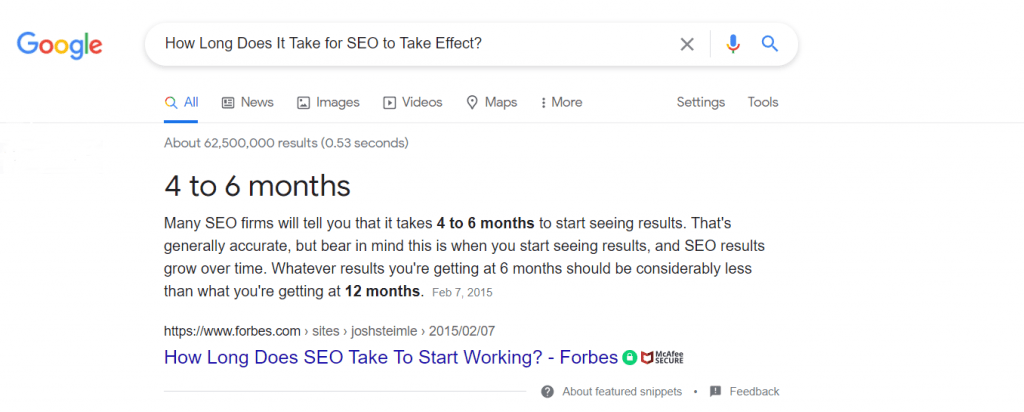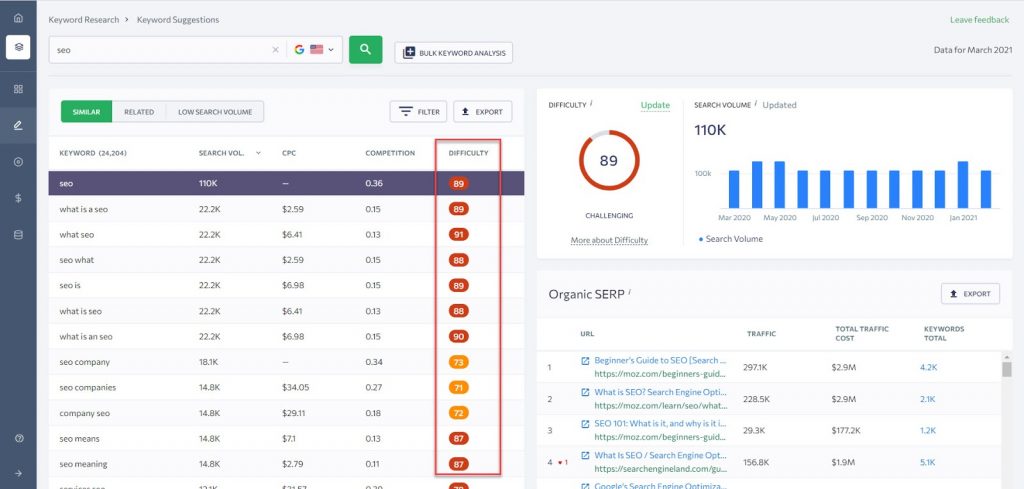Wondering why your website is still not getting traffic from search engines?
This is a sore spot among site owners who just paid X amount of dollars for an SEO campaign and are still waiting for results.
As frustrating as the situation may seem, the answer to this question isn’t as simple as you think, either.
In this article, we’ll not only answer the question but also understand the factors that affect the speed of your SEO results.
Ultimately, you’ll be able to gain insights as to how to approach SEO moving forward.
Table of Contents
What People Say About the Length of Time Before SEO Takes Effect
Let’s cut to the chase:
There are many answers to this question, and you probably won’t like all of them.
First, let’s look at what Google shows if you search for the same question:

4-6 months is a pretty realistic timetable for your SEO campaign to kick in. That means the effort you put into optimizing your website will manifest after at least four months.
And as time passes by, the effects of your SEO strategy magnifies. So expect your site to move up the ranks and grow in traffic even more after a year if you did your SEO correctly.
However, this is just one of the many answers that you’ll get.
Some would say that they saw immediate results from your SEO campaign, while others took longer than six months before seeing the effects.
Therefore, while 4-6 months gives Google more than enough time to crawl and index your pages, this timetable doesn’t necessarily apply to your site.
I know this feels like a non-answer, but here’s what I genuinely think:
You’re asking the wrong question.
Instead of worrying about how soon or long your SEO performance will take effect, the more important question is this:
Which factors affect how soon you can rank on search engines?
From here, you understand the issues that prevent or are slowing down your site from climbing the top of SERPs!
Why Does SEO Take So Long (If at All)?
We’ve already established that SEO is a marathon and not a race. Your goal now is to determine the factors that will help expedite the process of crawling and indexing your website.
Thus, below are reasons why your SEO isn’t reflecting well on SERPs.
There could also be a possibility that your SEO has not been properly set up initially, eventually affecting your keyword ratings.
Pages are not optimized enough
Content is integral to a successful SEO strategy.
Your content’s ability to convert visitors into customers or clients will help grow and scale your business.
However, from an SEO perspective, you want your content to rank on organic search for its target keywords.
This is easier said than done, considering the volume of content published every minute of the day. Thus, you need to cut through the content noise by creating content that search engines and your audience would love.
Once you find that sweet spot, solving other SEO-related issues becomes less challenging.
The site is not authoritative enough
Let’s take a step back and talk about the overall health of a website. The speed of Google ranking your pages hinges on how much authority your site has.
Authority, in this case, is determined by several factors explained above.
The second factor is backlinks.
In a nutshell, you need to build high-quality links to inform search engines that your site is trustworthy. Think of backlinks as a sign of recommendation—the more recommendations you get from people who matter, the more people will respect and look up to you.
This is important, especially if you’re running a local business like a lawyer or real estate agent. You want to instill a sense of confidence whenever Google looks at your site based on the quality of sites linking to it.
Therefore, by finding backlink opportunities using free tools, for starters, you can get Google to look up to your site and rank it higher as a result.
However, getting the type of links that’ll move the needle is a tall order. It’s easy to get links from directory sites where you just sign up and submit your site to its directory of thousands, if not millions, of unrelated sites to yours.
Nonetheless, getting editorial links from websites that generate millions of monthly visitors is something you should strive for. Acquiring them requires you to have a process in place. For instance, you need to develop and monitor link campaigns to help find the best opportunities and check if your best backlinks remain active over time.
Concerning content, websites prefer linking to useful and authoritative content. So if you follow the steps of creating great content that makes you money in the infographic above, you can use it to generate more links to your site and boost your authority.
The site is in a very competitive niche
If your niche is crowded with authoritative websites, then you already have your work cut out for you.
To get an idea of your site’s approximate ranking timeline, look at the difficulty of keywords you are targeting.

The higher the difficulty, the more time you must invest into producing better content and backlinks.
The key to overcoming competitive niches is consistency.
As long as you stick to your SEO plan as long as it takes, you can eventually get to the level of your top competitors.
So if you only hired an SEO guy to launch a 3-month-long campaign for your site, you may want to consider getting him again for a longer contract.
This reason is why new websites already work at a disadvantage from the get-go. They’ll have to catch up with the quality content and the backlinks your competitors have accumulated over the years.
And the situation becomes exponentially worse if they’re in a cutthroat niche.
That’s what you need to get cracking and optimize your site, pronto! Start by laying down the SEO foundation of your site before getting into the nitty-gritty of SEO, i.e., building links and monitoring backlinks.
The issue that may arise here is you may be unwilling to lock in with a lengthy campaign if you haven’t seen results yet. While this concern is valid, you also have to trust the process and let your SEO expert handle the campaign for you.
The website has poor SEO
If you enlisted help from an SEO who overpromised and underdelivered, don’t lose your hope. You may have been blindsided by their lower prices.
When searching for an SEO expert to help you build a sustainable website, focus on your biggest priorities and communicate them.
Thankfully, you can still undo the damage these guys did to your site with a knowledgeable SEO person in tow.
However, it’s also possible that your site may have undergone a sitewide penalty which means that your site won’t be getting the usual traffic on Google (if it is already driving traffic). This will be much trickier since you’ll have to wait for Google to update its algorithm before you can recover lost rankings.
Take this as a lesson when hiring SEOs to work on your site. You need to vet them properly and have them send over a business proposal detailing everything they’ll do before even letting them touch your site.
SEO is an Ongoing Process
It’s okay if your site isn’t dominating SERPs after a few days or weeks. It’s perfectly normal if it’s still not ranking after a few months.
There’s no point in rushing SEO since you really can’t control how Google crawls your site.
Instead, what you can control is whether your site is correctly optimized for the factors that matter. As long as you keep doing right by your SEO, you should be able to rank soon enough.
At the same time, SEO is just one of the many marketing strategies you can implement on your site. If you’re getting impatient with your current SEO progress, it’s time to focus your energies on promoting your site on social media, through email marketing, or by reaching out to a digital marketing agency.

Andrej Fedek is the creator and the one-person owner of two blogs: InterCool Studio and CareersMomentum. As an experienced marketer, he is driven by turning leads into customers with White Hat SEO techniques. Besides being a boss, he is a real team player with a great sense of equality.
